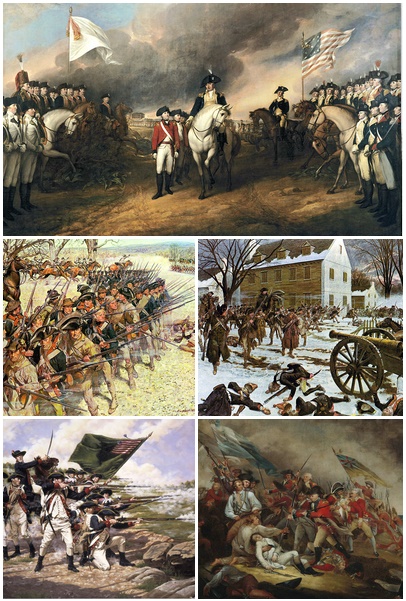American Revolutionary War
From Wikipedia, the free encyclopedia
"Revolutionary War" redirects here. For revolutions in general, see Revolution.
This article is about military actions only. For political and social developments, including the origins and aftermath of the war, see American Revolution.
| American Revolutionary War | |||||||||
|---|---|---|---|---|---|---|---|---|---|
 Clockwise from top left: Surrender of Lord Cornwallis after the Siege of Yorktown, Battle of Trenton, The Death of General Warren at the Battle of Bunker Hill, Battle of Long Island, Battle of Guilford Court House | |||||||||
| |||||||||
| Belligerents | |||||||||
|
| Native Americans[6] | ||||||||
| Commanders and leaders | |||||||||
| Strength | |||||||||
United States:
453,785 Militia 40,000 (Average)[9] 5,000 Continental Navysailors (at height in 1779)[10] no ships of the line 53 other ships (active at some point during the war)[10]
Allies:
Native Allies: Unknown12,000 French (in America) 63,000 French and Spanish (at Gibraltar) 146 ships of the line (active 1782)[11] |
Great Britain:
39,000 (Average)[9] 7,500 (at Gibraltar) 94 ships of the line (active 1782) [11] 171,000 Sailors[12]
Loyalist forces:
19,000 (total number that served)[13] 20,000 Freed slaves in the service of the British army[citation needed]
German auxiliaries:
Native Allies: 13,000[15]30,000 (total number that served)[14] | ||||||||
| Casualties and losses | |||||||||
America:
Spain: 5,000[18]6,824 killed in battle 25,000-70,000 dead from all causes[9][16] Overall casualties up to 50,000[17] France: 10,000 battle deaths (75% at sea) | Germans: 1,800 killed in battle[9] | ||||||||
| ||
The American Revolutionary War (1775–1783), theAmerican War of Independence,[N 1] or simply theRevolutionary War in the United States, was the rebellion ofthirteen of the North American colonies of Great Britain who declared themselves independent in 1776 as the United States of America.[N 2][20] France signed an alliance with the new nation in 1778, which escalated the conflict into a world warbetween Britain and France, Spain, and the Netherlands. Contemporaneous fighting broke out in India between the British East India Company and the French allied Kingdom of Mysore.
The war had its origins in the resistance of many Americans to taxes imposed by the British parliament, which they claimed were unconstitutional. Patriot protests escalated into boycotts and the destruction of a shipment of tea at the Boston Tea Party. The British government punished Massachusetts by closing the port of Boston and altering its charter. The Patriots in Massachusetts responded by setting up a shadow government which took control of the province outside of Boston. Twelve other colonies supported Massachusetts, formed a Continental Congress to coordinate their resistance, and set up committees and conventions which effectively seized power from the royal governments. In April 1775 fighting broke out between Massachusetts militia units and British regulars at Lexington and Concord. The Continental Congress appointed General George Washington to take charge of militia units besieging British forces in Boston, who were forced to evacuate in March 1776.
In July 1776, the Continental Congress formally declared independence.[21] The British were meanwhile mustering forces to suppress the revolt. Sir William Howe outmaneuvered and defeated Washington, capturing New York City and New Jersey, but Washington captured a Hessian detachment at Trenton and drove the British out of most of New Jersey. In 1777 Howe's army launched a campaign against Philadelphia instead of aiding Burgoyne's separate invasion force from Canada. Unsupported by Howe, Burgoyne's army was forced to surrender after the Battles of Saratoga in October 1777. This event caused France to enter the war in 1778, followed by their ally Spain in 1779.[22] The participation of France, Spain and the Netherlands was decisive as they contributed crucial land and sea power to the war and forced the British to divert a large portion of their resources away from North America.[23]
After 1778 the British shifted their attention to the southern colonies, which brought them initial success when they recaptured Georgia and South Carolina for the Crown in 1779 and 1780. In 1781 British forces attempted to subjugateVirginia, but a French naval victory just outside Chesapeake Bay led to a Franco-American siege at Yorktown and the capture of over 7,000 British soldiers. The defeat at Yorktown, as well as reverses elsewhere, finally turned opinion in the British Parliament against the war. In 1783, the Treaty of Parisended the war and recognized the sovereignty of the United States over the territory bounded roughly by what is now Canada to the north, Florida to the south, and the Mississippi River to the west.[24][25]
No comments:
Post a Comment